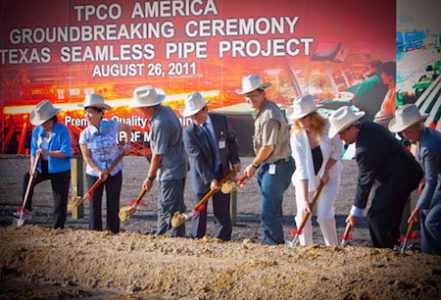By Dorinda Elliott
 In 2009, Tianjin Pipe Company, China’s largest steel pipe producer, announced that it would invest more than $1 billion in a new factory in the tiny town of Gregory, Texas, population 2,318. Facing US tariffs, the Chinese company had decided to start manufacturing near its US market, and in 2007, it started scouting locations across the United States. Gregory beat 73 communities.
In 2009, Tianjin Pipe Company, China’s largest steel pipe producer, announced that it would invest more than $1 billion in a new factory in the tiny town of Gregory, Texas, population 2,318. Facing US tariffs, the Chinese company had decided to start manufacturing near its US market, and in 2007, it started scouting locations across the United States. Gregory beat 73 communities.
How did a tiny Texas town attract the largest single manufacturing investment by a Chinese firm? Proximity to the Texas oil fields was important, and tax incentives helped, according to the Paulson Institute Case Study, “Pipe Dreams.” But in the end, the Chinese company’s decision may have come down to the tenacity of one driven woman—and good old fashioned Texas hospitality.
Tianjin Pipe is one of those old-fashioned state-owned Chinese companies—massive, not exactly known for its dynamism, and very much controlled by the government. But folks in Gregory, Texas, didn’t care about ideologies or what kind of company it was: they saw an opportunity for economic development.
As executive director of the San Patricio County Economic Development Corp., Josephine Miller had a budget of only $200,000, but she wanted that Chinese investment and the 600 plus jobs it would bring. So she teamed up with her competitor, Corpus Christi, with bigger budgets and the ability to wrangle tax incentives.
They always say that in China, personal relationships are what close deals. Miller already had those at the local level—and she worked hard to build them with her Chinese clients.
When a land deal fell through, Miller found land nearby. The owner of one parcel agreed to sell only after Miller pointed out that her father and the owner’s father had been good friends. The owners of an adjacent plot, reluctant to sell to Chinese (“I was talking to people who remembered the Korean War,” Miller recalls, “and I was telling them to sell to the Chinese!”), came around thanks to Miller’s persistence and the pipe company’s willingness to pay top dollar.
Miller’s tenacity impressed the Chinese company. She also took care to develop personal relationships with its executives. She kept track of a forgetful advisor’s cellphone and briefcase at meetings, for example. “We did not win this project based on incentives,” Miller says. “I always felt that the Chinese came to our area because they felt socially comfortable.”




